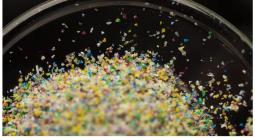Most soft plastic collected for recycling is burned, campaigners say
Everyday Plastic calls supermarket takeback schemes a diversion and says there is too much plastic packaging
Seventy per cent of soft plastic collected in supermarket recycling schemes and tracked after collection ended up being burned, an investigation by campaigners has found.
By placing trackers inside packages of soft plastic that were collected by Sainsbury’s and Tesco in July 2023 and February 2024, campaigners found that most of them ended up being incinerated rather than recycled.
Everyday Plastic, which carried out the investigation alongside the Environmental Investigation Agency, tracked parcels of soft plastic that the supermarkets collected from customers with the promise they would be recycled. Of 40 packages of plastic, the trackers reached end destinations in 17 cases. Of these, 12 packages were used as fuel pellets or burned for energy, the investigation found.
When Sainsbury’s launched its in-store soft plastic collection in 2021, it said: “The innovative recycling system allows customers to recycle polypropylene film found in several household products.”
Tesco said its customers would be able to bring back any soft plastic packaging for recycling. Soft plastic is hard to recycle and very few facilities in the UK have the ability to process it.
Alison Colclough, of Everyday Plastic, said: “Our trackers reveal the hard truth about soft plastic recycling schemes at supermarkets – soft plastic packaging is not going to get recycled.
“The majority of the bundles of soft plastic we tracked ended up being burned for energy recovery – a solution that is being deployed more and more in order to deal with the unmanageable amount of plastic waste.
“The takeback schemes are being presented as a solution, which is diverting attention from the main issue that can’t be overlooked: far too much unnecessary plastic packaging is being produced.”
Katie-Scarlett Wetherall, of the environmental NGO Client Earth, said the investigation into what was really happening to soft plastic collected by supermarkets revealed a huge gap between what consumers were being told and the reality. She said soft packaging recycling claims made on packages were misleading.
Next month countries will attempt to hammer out a global plastics waste treaty after a pushback from developed countries over the proposed remit. In the last talks on the UN plastics treaty there were accusations that developed nations had bowed to the fossil fuel and plastics lobby over whether cuts in plastic production should be a key part of the treaty.
The UK sends most of its plastic waste abroad, exporting nearly 600,000 tonnes of plastic waste for recycling in 2023, a 10% increase on the previous year. In August 2023 alone, nearly 53,000 tonnes of plastic waste was exported.
Turkey was the largest destination for UK plastic waste exports in 2023, taking more than 140,000 metric tons. The Netherlands received the second most, at 116,500 metric tons.
Plastic waste exports are counted in UK government recycling data.
Sainsbury’s said: “We’re always seeking ways to positively manage the end of life of our packaging. Our return to store recycling scheme provides the opportunity to recycle more soft plastic until kerbside collection becomes available in 2026-27.
“We collect a small volume of flexible plastic overall in store. The majority is in good condition and so is recycled. However, when materials are soiled or damaged then they may need to be converted for energy, which is managed by our supplier.”
A Tesco spokesperson said: “We have a clear plan to remove packaging wherever possible and reducing, reusing and recycling it where we can’t. Given the challenges of collecting soft plastics at kerbside, we have soft plastics collection points in our stores for customers.
“Where it is not possible to recycle the collected plastic, we put it to alternative uses to avoid these materials going to landfill, for example using it for energy recovery.”





